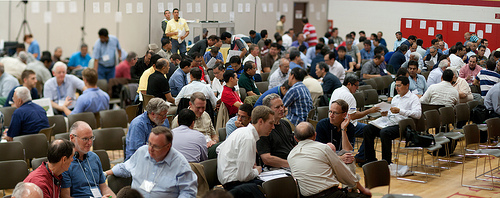|
Youth work
and mission challenges and the juvenilization of culture
During the International Coordinators Meeting of the Sword of the Spirit,
held in Newark, New Jersey May 25-29, two sessions focused on some of the
key challenges which affect work with young people and mission in general.
Dan Keating and Tom Bergler each gave a presentation on some of these challenges.
Dan is a mission coordinator and elder of the Servants of the Word. Tom
is associate professor of youth ministry and missions at Huntington University,
Indiana, and a frequent speaker at Kairos conferences and summer academy.
Three key challenges
Dan Keating gave an overview of areas in which we can expect from the
social environment of today significant challenges to our call and mission.
The first area he mentioned was a continual “slide” in modern secular culture
in the area of moral life. Dan said, “This is a huge challenge to us. If
our call is centered on living a way of life – a way of life that follows
the gospel – then the constant change away from a Christian moral or ethic
will hit us directly. It is a headwind blowing more and more strongly,
and it is right in our faces. We should not be surprised about this.” Dan
mentioned that in some parts of the world this is a wind that is coming
from the side, rather than a direct hit in the face. He warned, however,
that “the wind is shifting constantly, so that more and more it will be
directly in our faces, and we will have to live our life in a stronger
headwind of immorality.”
Dan gave one example of the issue of same-sex marriage. This is now
quite accepted in Europe and Canada, and more and more becoming the standard
in the USA. Dan said that for most people, they cannot even see why it
could possibly be a problem! He said that there has been a steady but radical
shift in the past 10 years on this – and it doesn’t look like it is going
to turn back any time soon.
A second challenge which Dan described was the rise in religious persecution.
Dan said that there has always been noteworthy religious persecution in
parts of the world. But general religious persecution is on the rise, and
it is having an impact in more parts of the world.
The third challenge Dan presented was the area of financial hardship
and struggle, which, he said, seems to rise and fall from place to
place. He said that we may be in for a longer-term period in which financial
hardship will become the rule, rather than the exception. Dan said that
we may have to learn how to go about our community life, and our community
building and expansion, with less financial resource than in the past.
This, he said, may affect whole communities and regions, but also affects
the amount of money a family has available to send their children to many
of our events – and we may need to learn new ways of doing many of the
same things with fewer or less financial resources.
“Juvenilization”
of Culture
 Tom
Bergler gave a presentation on the profound cultural shift towards an increasing
immature form of Christianity caused by the “juvenilization”
of society and its impact on Christians as well. Tom defined juvenilization
as “the process by which the religious beliefs, practices and developmental
characteristics of adolescents become accepted as appropriate for Christians
of all ages. It begins with the praiseworthy goal of adapting the faith
to appeal to the young. But it sometimes ends badly, with both youth and
adults embracing immature versions of the faith.” Tom
Bergler gave a presentation on the profound cultural shift towards an increasing
immature form of Christianity caused by the “juvenilization”
of society and its impact on Christians as well. Tom defined juvenilization
as “the process by which the religious beliefs, practices and developmental
characteristics of adolescents become accepted as appropriate for Christians
of all ages. It begins with the praiseworthy goal of adapting the faith
to appeal to the young. But it sometimes ends badly, with both youth and
adults embracing immature versions of the faith.”
Tom pointed to three leading causes of this problem: Modern youth culture
tends to create the need to adapt Christianity to appeal to youth. The
time between puberty and full adulthood is getting longer in society in
general. And the understanding of adulthood has increasingly changed to
allow more immaturity.
Moralistic, therapeutic
deism
Tom cited a national study of youth and religion, conducted in the
US, which showed that American teenagers have a faith that can be described
as “moralistic, therapeutic deism.” Tom then defined each of these terms:
A moralistic approach promotes the view “God wants me to be good.
The main purpose of religion is to help me be good. But most people are
good on their own, so religious involvement is optional.” The therapeutic
approach promotes the view that “I like God, my faith and my church because
they help me feel better about my problems.” The deism approach promotes
the view that “God is there, in the background, when I need him for help.
But he is not central to my life.”
Adolescent Christianity
Tom cited several characteristics of what he called “adolescent Christianity”:
(1) Adolescent spirituality favours touch, physical activity, and other
bodily ways of expressing faith. (2) Adolescent Christians are concerned
about how their faith relates to their sexuality and their romantic relationships.
They want to experience a “personal relationship with God” and like the
idea of “falling in love” with Jesus. (3) Cognitively, adolescents are
growing in their ability to think abstractly. They can now grapple with
concepts like love, truth or justice. In their new found zeal, and their
excitement over a new cause, they easily become judgmental of adults who
don’t share their enthusiasm. (4) Adults influenced by adolescent Christianity
romanticize the supposed idealism and zeal of youth and try to conform
to its patterns – adolescent Christians blame someone else for the
world’s problems and seldom recognize their own role in evil social systems.
(5) Adolescents lean heavily on a few close friends who provide a sense
of emotional security, advice, and acceptance, and less on parents and
the wider adult community. (6) Adolescent Christians see faith as incomplete
unless it is affecting them emotionally. Tom concluded by stating that
“adolescent Christianity lacks a biblical vision of spiritual maturity,
dislikes the goal, and prefers the journey.”
Tom cited four problems which he saw with juvenilization: (1) We are
not trained to think and speak clearly about truth and morality. (2) We
don’t have a higher sense of purpose and goal in life (the highest and
most noble goal is to live a comfortable life). (3) Peer groups that promote
immaturity (routine intoxication, extreme amounts of time on video games).
(4) Civic engagement is viewed as something good for someday – but not
now. No time or money for volunteering. No moral obligation to serve others.
The new immature
adulthood
Tom then described what he saw as the key characteristics of what he
called “the new immature consumer adult.” These characteristics include
the following: being impulsive, searching for identity, focused on
self and my needs; believing that material goods can heal my pain, craving
the approval of others, willing to spend as if one doesn’t have other responsibilities.
Tom summarized by stating that “people who behave like adolescents make
good consumers.”
Tom contrasted the new immature adulthood with the “old adulthood” which
emphasized responsibility, duty, and caring for others. He said that
the old adulthood was not perfect, as anyone knows who dealt with an emotionally
distant father. But, he said that the new adulthood has removed the
expectation that becoming an adult includes growing out of the immature
ways of adolescence.
He concluded his presentation by observting that today adulthood has
been disconnected from maturity. He said that this creates two problems
for raising young men: (1) It is harder for young men to see maturity as
desirable and attainable. (2) And fewer adults can model and teach maturity.
Tom emphasized throughout his presentation that these problems are not
caused by adolescents, but by the adults who are shaping society.
Intergenerational
communities
Tom stated that, “Only intergenerational communities of people devoted
to mature Christianity can build sea walls high enough to hold back the
tide of juvenilization that has now risen high enough to threaten
all of us.”

What do we need
to do?
Dan Keating concluded the morning session with three recommendations
for how leaders should move forward in facing these challenges.
Great Courage
Dan stated that if we are going to face a more hostile culture, more
persecution, and more financial difficulty, then we will need real courage.
He said that courage is defined as “the willingness to die in battle.”
He stated that “we will need the willingness to really suffer and even
die for the faith. I think the Lord will be calling us to greater courage
in the days to come. Let us pray to the Lord for courage.”
Deep Wisdom
He also stated that he believed we would need deep wisdom to
handle the coming challenges. He said that there will be need for genuine
prudence in responding to new situations and to opposition to our approach
to raising up children for the Lord.
Anchored Faith
Dan also said that we would “need deep roots of faith to weather
the storms that the Lord has promised and that we can see coming. A lot
of trees are going to be uprooted in the winds that are blowing. How will
we stand? We need deeply anchored faith in the Lord, in his promises, in
eternity.”
Dan finished by reminding the coordinators that “with men it is impossible,
but not with God; for all things are possible with God” (Mark 10:27). He
stated, “Let us put our trust in the one who can do the impossible!”
>
continued
next page page
all photos by (c) Nico
Angleys 2012
|